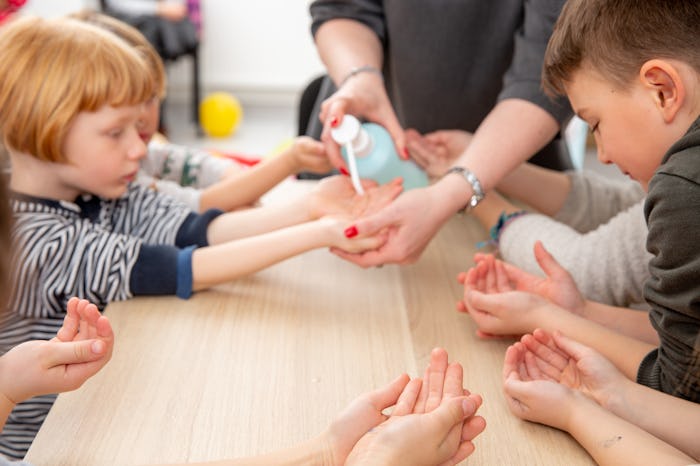Life

Day Cares Need Your Help To Handle The Coronavirus Pandemic
Many parents rely on day care facilities for child care, and if those facilities are forced to close due to the COVID-19 outbreak, it could put parents — and the day cares — themselves in a serious bind. For parents, knowing how their child's day care will deal with coronavirus is a top priority.
"We have heard from several child care providers around the country who are very concerned about the impact of the coronavirus on the children and families they serve, and on their staff members," Lynette M. Fraga, Ph.D., Executive Director of Child Care Aware of America, tells Romper. "They are also concerned that they may have to close and could lose their business. We’ve also heard from parents who don’t know where to turn for backup child care if their primary providers are forced to close."
The Centers for Disease Control and Prevention (CDC) has published guidelines for schools and day care facilities in response to the spread of the virus, including detailed responses for schools with confirmed cases of COVID-19 in their community. The CDC has also published several informative fact sheets for day cares to hand out to parents and staff, and national child care advocacy organizations like Child Care Aware of America have made emergency preparedness plans available online.
Some day care facilities have also taken to the web to offer parents the latest COVID-19 information as it pertains to their facilities, including when parents should keep children home from day care. Bright Horizons, a day care facility with locations nationwide, tells Romper that in addition to posting current guidelines and resources for parents on their website, they are "continually monitoring the situation and adjusting guidance based on the CDC."
"Day cares should be reinvigorating and stressing their hygiene routines, reviewing with the children how to properly wash their hands, and going over physical boundaries and contact rules, stressing the importance of avoiding touching your face or that of another student," Dr. Niket Sonpal, a New York-based internist and gastro tells Romper.
Parents can also support their child's day care by following suit to help prevent the spread of illness in their communities and keeping sick kids home from day care to prevent the virus from spreading. "Day cares must keep an open line of communication with family members in order for information to flow more efficiently between the parents and the school as to absences, sickness, symptoms, or concerns," Sonpal says. "Children and staff with respiratory symptoms and fevers should be kept away from other students, and according to the CDC, they should be asked to go home."
Experts recommend that if parents notice any coronavirus symptoms in kids to contact your physician by phone, and notify the day care so that they may contact public health officials.
Per the CDC, child care facilities should perform routine environmental cleaning if no cases have been reported in their area. However, more extreme measures including potential closures and deep cleaning are suggested for facilities with confirmed exposure. A day care in Acworth, Georgia was forced to close its doors on March 10 for deep cleaning after a teacher tested positive for COVID-19. This closure is reported to be the first day care closure caused by the virus, according to the local CBS 46 News station.
As a child care advocacy organization, Fraga says that Child Care Aware of America anticipates that day cares nationwide, as well as the families who use them, will need additional support during this outbreak. "While this is a quickly evolving situation, we’re listening closely to the needs of providers and hope policymakers will as well," she says.
Some of that additional support may need to come from monetary supplements for employees and backup child care options for parents.
"We know that one of the best ways to prevent the transmission of communicable diseases is to ensure that sick individuals can stay home. Without job-protected paid sick days, this is an untenable choice for too many people — families and child care providers alike — who cannot risk losing wages or being fired even if they are sick."
Fraga urges any parent or day care provider who is concerned about the potential impact of COVID-19 on their child care to stay up-to-date on ways to advocate for your family's needs during this time.
If you think you’re showing symptoms of coronavirus, which include fever, shortness of breath, and cough, call your doctor before going to get tested. If you’re anxious about the virus’s spread in your community, visit the CDC for up-to-date information and resources, or seek out mental health support. You can find all of Romper’s parents + coronavirus coverage here, and Bustle’s constantly updated, general “what to know about coronavirus” here.
Experts:
Dr. Niket Sonpal, New York-based internist, gastro, and adjunct professor at Touro College
Lynette M. Fraga, Ph.D., Executive Director of Child Care Aware of America